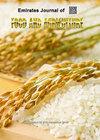海洋藻类提取物作为生物刺激剂提高莴苣的耐盐性
IF 0.7
4区 农林科学
Q3 AGRONOMY
引用次数: 0
摘要
本研究的目的是探讨海洋藻类提取物叶面喷施对盐碱条件(50mM 和 100mM)下生长的温室莴苣(Lactuca sativa L.)植株的生长、生理、矿物质组成、不同渗透保护剂水平、抗氧化系统各部分以及基因表达的影响。通过 LC/MS 分析,藻类提取物的酚类成分被确定为含有丰富的喹酸、没食子酸、山柰酚和木犀草素。盐胁迫导致叶片脯氨酸浓度增加,而生物量产量、叶绿素荧光、SPAD 指数和矿物质成分均下降。莴苣的盐胁迫耐受机制涉及编码抗氧化酶(包括 LsSOD、LsCAT 和 LsAPX)的基因在受胁迫植株和对照植株中的表达,这表明了它们的重要作用。研究结果表明,用海洋藻类提取物处理过的植物应对盐胁迫的能力更强,表现在植物生长、SPAD 指数、Fv/Fm 比率显著增加(p < 0.05),营养状况更好,而且对盐胁迫有更好的渗透保护作用。丙二醛水平、过氧化氢和稳定性指数水平明显下降。此外,抗氧化系统也有明显改善,在中等胁迫条件下(50 毫摩尔),过氧化氢酶(CAT)、超氧化物歧化酶(SOD)、过氧化氢酶(CAT)和抗坏血酸过氧化物酶(APX)的活性都有所提高,受胁迫植物中的 LsCAT 转录物也更丰富。 总之,我们的研究结果表明,海洋藻类提取物似乎是一种有效的生物刺激剂产品,可用于处理盐碱条件下的莴苣。 关键词:抗氧化酶;叶绿素荧光;基因表达;生长性能;莴苣;海洋藻类提取物;矿物质成分;渗透保护剂。本文章由计算机程序翻译,如有差异,请以英文原文为准。
Marine Algal Extract as a Biostimulant to Improve Tolerance to Salinity in Lettuce Plants
The purpose of this study was to investigate the impact of marine algal extract as foliar spray on growth, physiological, mineral composition, different osmoprotectant levels, various parts of antioxidant system, and gene expression of greenhouse lettuce (Lactuca sativa L.) plants grown under saline conditions (50mM and 100mM). Through LC/MS analysis, the algal extract's phenolic composition was determined by its abundance in quinic acid, gallic acid, kaempferol and luteolin. The concentration of leaf proline increased while the biomass production, chlorophyll fluorescence, SPAD index and mineral composition all decreased as a result of salt stress. The salt-stress tolerance mechanism in lettuce involved the expression of genes that encode antioxidant enzymes, including LsSOD, LsCAT, and LsAPX, in both stressed and control plants, which demonstrates their important roles. The findings revealed that plants that were treated with marine algal extract had a greater ability to handle salt challenge, as evidenced by a significant (p < 0.05) increase in plant growth, SPAD index, Fv/Fm ratio, a better nutritional status in addinto a better osmoprotection against salt stress. Malondialdehyde level, Hydrogen peroxide and stability index levels were significantly decreased. Furthermore, the antioxidant system saw a significant improvement, as demonstrated by the increased activity of catalase (CAT), superoxide dismutase (SOD), catalase (CAT) and ascorbate peroxidase (APX) under moderate stress conditions (50mM) and more abundant LsCAT transcripts in the stressed plants. Overall, our findings indicate that marine algal extract appears to be an effective biostimulant product for treating lettuce under saline conditions. Keywords: antioxidant enzymes, chlorophyll fluorescence, gene expression, growth performance, Lactuca sativa L., marine algal extract, mineral composition, osmoprotectants.
求助全文
通过发布文献求助,成功后即可免费获取论文全文。
去求助
来源期刊

Emirates Journal of Food and Agriculture
AGRONOMYFOOD SCIENCE & TECHNOLOGY&nb-FOOD SCIENCE & TECHNOLOGY
CiteScore
1.80
自引率
0.00%
发文量
18
期刊介绍:
The "Emirates Journal of Food and Agriculture [EJFA]" is a unique, peer-reviewed Journal of Food and Agriculture publishing basic and applied research articles in the field of agricultural and food sciences by the College of Food and Agriculture, United Arab Emirates University, United Arab Emirates.
 求助内容:
求助内容: 应助结果提醒方式:
应助结果提醒方式:


